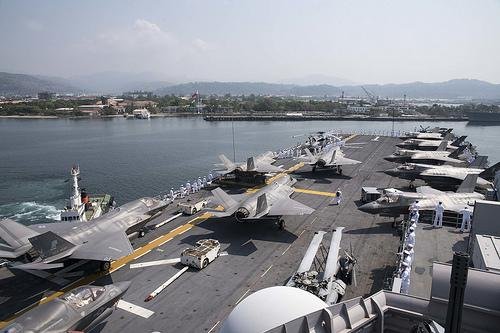1 of 2 | Sailors aboard USS Wasp prepare to man the rails as the amphibious assault ship arrives in Subic Bay on March 30 on the South China Sea. Photo by MC3 Benjamin F. Davella III/
U.S. Navy
April 8 (UPI) -- U.S. Navy ships won't participate in the 70th anniversary of the founding of China's People's Liberation Army Navy later this month, the Pentagon said.
The U.S. Embassy's defense attache in Beijing will represent the United States in Qingdao from April 22 to 25, Pentagon spokesman Lt. Col. Dave Eastburn told Stars and Stripes.
"The United States Navy will continue to engage the PLAN [People's Liberation Army Navy] through established military-to-military dialogues, such as the Military Maritime Consultative Agreement working groups and Rules of Behavior discussions," Eastburn said.
The will include "a high-level seminar, an international fleet review, military tattoo performances and cultural and sports activities," ministry spokesman Senior Col. Wu Quian's said at a news conference last month.
"The U.S. government seeks a bilateral relationship that is results-oriented and focused on risk reduction," Eastburn told the Japan Times. "The U.S. Navy will continue to pursue its primary goal of constructive, risk-reduction focused discourse with the PLAN."
China plans to showcase its new nuclear-powered ballistic missile submarines at the April 23 naval parade in the Yellow Sea near Qingdao.
"America's ships and sailors are needed across the Indo-Pacific," Senate Armed Services Committee Chairman Jim Inhofe, R-Okla, told the Free Beacon. "America's Navy is busy enough confronting the challenges posed by China's aggression in the South China Sea and other critical aspects of great power competition without the distraction of participating in communist pageantry."
The Pakistani navy also is unlikely to send warships to take part in parade after initially planning to send two ships, Hindustan Times reported.
Japanese Defense Minister Takeshi Iwakya said last month that the Maritime Self-Defense Force would send a destroyer.
Prime Minister Shinzo Abe has improved relations with China as U.S. President Donald Trump's relation is more strained.
"Japan has actually improved relations with China in substantial ways," Zhang Baohui, director of Lingnan University's Center for Asian Pacific Studies in Hong Kong, told Japan Times. "Its foreign policies, under Abe and in the context of Tokyo's concerns for Trump's trade policies and alliance politics, have become more independent," he said.
Two other U.S. allies -- South Korea and the Philippines -- are sending sending vessels, according to Japan Times.
In Last April's naval review in the South China Sea, there were 48 vessels and 76 planes, including China's first aircraft carrier, the Liaoning.
But tensions have increased between the United States and China regarding Taiwan and the South China Sea.
On March 31, China sent a fighter jet over the median line in the Taiwan Strait between mainland China and Taiwan. China's state-run media reported that it was meant to rebuke the United States, which has sent its Navy through the strait on freedom-of-navigation operations five times in the last six months
"China firmly opposes any forms of official and military ties between the U.S. and Taiwan. We have made clear our stern position to the U.S. many times," Wu said at a March 28 news conference.
The United States is committed to the One China policy, which acknowledges China's claim on Taiwan. In return, the United States doesn't officially recognize Taiwan.
A 1979 law states that the United States will defend Taiwan from a mainland attack.
China and the United States have been at odds over the 27 islands and reefs in the South China Sea. China has built military outposts on at least 12 of them since 2014. Those claims are not recognized by international law. Taiwan, Vietnam, Malaysia, Brunei and the Philippines all have competing interests there.
Last year, the United States withdrew an invitation to China for Rim of the Pacific exercises off Hawaii in response to it actions in the South China Sea.















